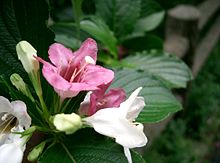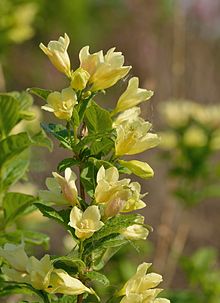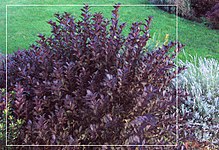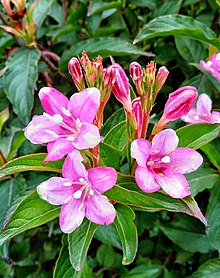Weigela
| Weigela | |
|---|---|

| |
| Weigela coraeensis flowers and leaves | |
| Scientific classification | |
| Kingdom: | Plantae |
| Clade: | Tracheophytes |
| Clade: | Angiosperms |
| Clade: | Eudicots |
| Clade: | Asterids |
| Order: | Dipsacales |
| Family: | Caprifoliaceae |
| Subfamily: | Diervilloideae |
| Genus: | Weigela Thunb.[1] |
| Species | |
|
See text | |
Weigela /waɪˈdʒiːlə/[2] is a genus of between six and 38 species[3] of deciduous shrubs in the family Caprifoliaceae, growing to 1–5 m (3–15′) tall. All are natives of eastern Asia. The genus is named after the German scientist Christian Ehrenfried Weigel.[4]
Description
The leaves are 5–15 cm long, ovate-oblong with an acuminate tip, and with a serrated margin.
The flowers are 2–4 cm long, with a five-lobed white, pink, or red (rarely yellow) corolla, produced in small corymbs of several together in early summer.
The fruit is a dry capsule containing numerous small winged seeds.
Fossil record
Several fossil seeds and fruit fragments of †Weigela srodoniowae have been described from middle Miocene strata of the Fasterholt area near Silkeborg in Central Jutland, Denmark.[5]
Garden history
The first species to be collected for Western gardens, Weigela florida, distributed in North China, Korea and Manchuria, was found by Robert Fortune and imported to England in 1845.[4] Following the opening of Japan to Westerners, several Weigela species and garden versions were discovered by European plant-hunters in the 1850s and 1860s, though they were already well known in Japan.[6]
The British Weigela national collection is held at Sheffield Botanical Gardens; along with the national collection of the closely related genus Diervilla.[4] The German Weigela national collection, Sichtungsgarten Weigela, is in Buckow, Märkische Schweiz.[7]
Ecology
Weigela species are used as food plants by the larvae of some Lepidoptera species including brown-tail.
Accepted species


| Image | Scientific name | Distribution |
|---|---|---|
 |
Weigela coraeensis Thunb.[8] | Japan (E. Central Honshu) |
 |
Weigela decora (Nakai) Nakai[8] | Central & S. Japan |
 |
Weigela floribunda (Siebold & Zucc.) K.Koch[8] | Japan (W. & Central Honshu, Shikoku) |
 |
Weigela florida (Bunge) A.DC.[8] | S. Russian Far East to N. & E. China and Korea, Japan (Kyushu) |
 |
Weigela × fujisanensis (Makino) Nakai[8] | Japan (C. Honshu) |
 |
Weigela hortensis (Siebold & Zucc.) K.Koch[8] | Japan (Hokkaido, Honshu) |
 |
Weigela japonica Thunb.[8] | S. China, S. Japan |
 |
Weigela maximowiczii (S.Moore) Rehder[8] | Japan (N. & Central Honshu). |
 |
Weigela middendorfiana (Carrière) K.Koch[8] | Russian Far East to N. & N. Central Japan |
| Weigela suavis (Kom.) L.H.Bailey[8] | Russian Far East | |
 |
Weigela subsessilis (Nakai) L.H.Bailey[8] | Korea |
Cultivation

Several of the species are very popular ornamental shrubs in gardens, although species have been mostly superseded by hybrids (crosses between W. florida and other Asiatic species). The following cultivars have gained the Royal Horticultural Society's Award of Garden Merit:[9]
- Weigela 'Red Prince'[10]
- Weigela florida 'Alexandra'[11]
- Weigela 'Florida Variegata'[12]
- Weigela 'Praecox Variegata'[13]
'Pink Princess' is a popular cultivar of Weigela, a shrub native to northern China, Korea, and Japan, that flowers profusely. It is a hardy plant, easy to grow and maintain. It grows to a height and width of up to 1.5–1.8 m (5–6 ft) in appropriate conditions, and is thus more compact than the normal Weigela florida, which makes it a more versatile shrub. It is attractive to hummingbirds and bees.[14]
Gallery

References
- ^ The genus Weigela and the type W. japonica were originally described and published in Kongl. Vetenskaps Academiens Nya Handlingar 1: 137, pl. 5. 1780[1781]. "Name - !Weigela Thunb". Tropicos. Saint Louis, Missouri: Missouri Botanical Garden. Retrieved December 2, 2012.
Type Specimens: T: Weigela japonica Thunb.
- ^ Sunset Western Garden Book, 1995:606–607
- ^ All of the species listed in the 'Selected species' section are accepted by The Plant List, but most are still under review, and therefore subject to changes in status. "TPL, treatment of Weigela". The Plant List; Version 1. (published on the internet). Royal Botanic Gardens, Kew and Missouri Botanical Garden. 2010. Retrieved December 2, 2012.
- ^ a b c "Sheffield Botanical Gardens Weigela". Sheffield Botanical Gardens Trust. November 26, 2008. Retrieved December 2, 2012.
- ^ Angiosperm Fruits and Seeds from the Middle Miocene of Jutland (Denmark) by Else Marie Friis, The Royal Danish Academy of Sciences and Letters 24:3, 1985
- ^ Mark Nesbitt, The Cultural History of Plants, 2005:284; Ran Levy-Yamamori, Ran Levy, Gerard Taaffe, Garden plants of Japan, 2004, s.v. "Weigela hortensis"
- ^ "Weigela Sichtungsgarten" (in German). Maerkische-Schweiz. Retrieved December 2, 2012.
- ^ a b c d e f g h i j k [1] Plants of the World online (powo.science.kew.org)
- ^ "AGM Plants - Ornamental" (PDF). Royal Horticultural Society. July 2017. p. 107. Retrieved 18 February 2019.
- ^ "Weigela 'Red Prince'". RHS. Retrieved 28 February 2019.
- ^ "Weigela florida 'Alexandra'". RHS. Retrieved 5 March 2021.
- ^ "RHS Plant selector Weigela 'Florida Variegata' (v) AGM/RHS Gardening". Royal Horticultural Society. 2011. Retrieved 17 March 2021.
- ^ "RHS Plant selector Weigela 'Praecox Variegata' (v) AGM/RHS Gardening". Royal Horticultural Society. 2011. Retrieved 17 March 2021.
- ^ Pritsch, Günter (13 September 2018). Bienenweide 220 Trachtpflanzen erkennen und bewerten (1. Auflage ed.). Stuttgart: Kosmos Verlag. ISBN 9783440159910. OCLC 1031716794.
